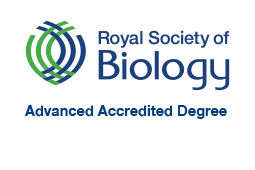Biochemistry Code C709 Attend an Open Day Attend an Open Day Clearing places available – 0800 121 40 80
Apply NowKey Facts
C709-
UCAS Tariff
128 - 120
-
Course duration
4 years
Available for September start 2025
Further details on entry requirements
Apply NowAt Aberystwyth University, the MBiol Biochemistry degree places special emphasis on the practical skills required by employers in the pharmaceutical and biotechnology industries. During your studies, you will explore the techniques that have revolutionised the study of cell biology, biological chemistry, metabolism and molecular genetics, through expert tuition in scientific protocol and hands-on lab work. You will also work on tasks designed to emulate the requirements of professional practice in biochemistry.
You will examine the structure and functions of the molecules that make up a cell and understand the way in which they interact in living processes. Our lecturers are active researchers, with first-hand experience of drug discovery, the investigation of diagnostic techniques, active synthesis of compounds and more.
This four-year course includes three years of undergraduate study and a further year of postgraduate-level study, leading to the qualification of MBiol (Biochemistry). The course is ideal if you aspire to a career as a research scientist in Biochemistry or just wish to take your Biochemistry knowledge to a higher level.
Course Overview
Modules September start - 2025
Please note: The modules listed below are those currently intended for delivery during the next academic year and may be subject to change. They are included here to give an indication of how the course is structured.
| Module Name | Module Code | Credit Value |
|---|---|---|
| Biological chemistry | BR17320 | 20 |
| Cell Biology * | BR17520 | 20 |
| Comparative Animal Physiology | BR16720 | 20 |
| Genetics, Evolution and Diversity | BR17120 | 20 |
| Skills for Biologists * | BR16820 | 20 |
Options
| Module Name | Module Code | Credit Value |
|---|---|---|
| Microbial Diversity and Disease | BR19020 | 20 |
| Microbial and Plant Diversity * | BR19920 | 20 |
| Module Name | Module Code | Credit Value |
|---|---|---|
| Applied Molecular Biology and Bioinformatics | BR20620 | 20 |
| Cell and Cancer Biology | BR25920 | 20 |
| Practical Skills for Biochemists | BR22920 | 20 |
| Proteins and Enzymes | BR26620 | 20 |
| Research Methods * | BR27520 | 20 |
Options
| Module Name | Module Code | Credit Value |
|---|---|---|
| Chromosome Dynamics | BR21820 | 20 |
| Evolution and Molecular Systematics | BR21720 | 20 |
| Immunology | BR22220 | 20 |
| One Health Microbiology | BR26520 | 20 |
| Practical and Professional Skills in Microbiology | BR24720 | 20 |
| Module Name | Module Code | Credit Value |
|---|---|---|
| Bioinformatics and Functional Genomics | BR37120 | 20 |
| Molecular Pharmacology | BR36120 | 20 |
| Research Project * | BR36440 | 40 |
| Biotechnology | BR35520 | 20 |
Options
| Module Name | Module Code | Credit Value |
|---|---|---|
| Microbial Pathogenesis | BR33720 | 20 |
| Molecular Biology of Development | BR36020 | 20 |
| Module Name | Module Code | Credit Value |
|---|---|---|
| Field and Laboratory Techniques | BRM4820 | 20 |
| Frontiers in the Biosciences | BRM0220 | 20 |
| MBiol Research Project | BRM2860 | 60 |
Options
| Module Name | Module Code | Credit Value |
|---|---|---|
| Hot Topics in Parasite Control | BRM0920 | 20 |
| Infection and Immunity | BRM1620 | 20 |
* Also available partially or entirely through the medium of Welsh
Careers
Teaching & Learning
Student Testimonials
Typical Entry Requirements
UCAS Tariff 128 - 120
A Levels ABB-BBB with B in Chemistry and B in Biology or Human Biology
GCSE requirements (minimum grade C/4):
English or Welsh, Mathematics and a Science subject
BTEC National Diploma:
BTEC not accepted for this scheme
International Baccalaureate:
32-30 points overall with 6 points in Chemistry and 6 points in Biology at Higher Level
European Baccalaureate:
75% overall with 7 in a relevant science
English Language Requirements:
See our Undergraduate English Language Requirements for this course. Pre-sessional English Programmes are also available for students who do not meet our English Language Requirements.
Country Specific Entry Requirements:
International students whose qualification is not listed on this page, can check our Country Specific Entry Requirements for further information.
The University welcomes undergraduate applications from students studying the Access to Higher Education Diploma or T-level qualifications, provided that relevant subject content and learning outcomes are met. We are not able to accept Access to Higher Education Diplomas or T-levels as a general qualification for every undergraduate degree course.
Our inclusive admissions policy values breadth as well as depth of study. Applicants are selected on their own individual merits and offers can vary. If you would like to check the eligibility of your qualifications before submitting an application, please contact the Undergraduate Admissions Office for advice and guidance.

